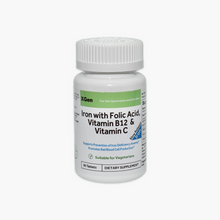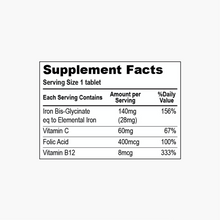- 90 Slow Release Tablets
- For people with iron deficiency
- For prevention of Iron Deficiency Anemia.
- Promotes red blood cell production.
- Promote immune system.
- Gentler to the stomach.
Additional Information
Features:
- Slow release makes it gentler to the stomach, and releases iron gradually .
- People who requiring multiple doses throughout the day can take less potent supplements, and do so less frequently, than with regular-release iron.
Iron:
Iron is vital for the production of hemoglobin, the part of red blood cells that ferries oxygen to cells. Nearly two-thirds of the body’s iron is found in hemoglobin, which explains iron’s key role in promoting life and supporting health. Smaller amounts of iron are found in myoglobin, a protein that’s responsible for transporting oxygen and storing it on a short-term basis within the muscles. Iron is critical for regulating cell growth and replication, as well as for skin repair. It supports your immune system and is required for normal brain and nervous system function.
It is an essential component of dozens of enzymes – proteins that initiate chemical reactions in the body – including those involved in energy production and for making DNA, the cells’ blueprint for reproduction. Iron supports your immune system, too. It is necessary to produce certain cells to make the enzymes that kill the germs that can make you ill.
Iron is required for normal brain and nervous system function at the cellular level and beyond. Neurotransmitters, the compounds that allow nerve cells to communicate, depend on iron, as does myelin, the protective sheath that surrounds and insulates nerve fibers. According to the USDA’s 2010 dietary guidelines for Americans, iron is one of the nutrients of concern for women in their childbearing years. A large number of females, who are capable of becoming pregnant, including adolescent girls, are deficient in iron. In fact, iron deficiency is the most common nutrient shortfall in the United States.
About 15% of the body's iron is stored for future needs and mobilized when dietary intake is inadequate. When iron levels in the blood are low for a prolonged period of time, there is insufficient iron available to support normal red blood cell production, which may result in iron-deficiency anemia. Iron deficiency can limit oxygen delivery and the production of enzymes that rely on iron to function properly, including those involved in energy production.
Insufficient dietary iron is often the culprit in iron deficiency and iron-deficiency anemia, but chronic bleeding or a large blood loss may also be to blame. In the absence of bleeding, including menstruation, or pregnancy, the body normally loses only tiny amounts of iron every day, so a constant loss of even a very small amount of blood may result in iron deficiency with time.
Inadequate iron intake resulting in deficiency can lead to health complications. Symptoms include:
- Fatigue; Muscle weakness; Lack of stamina; Light-headedness; Loss of libido; Sluggish immune system.
These symptoms are associated with poor oxygenation of the body, both in muscles and in several organs such as the brain, heart, kidneys and lungs. Scientists have also observed that a lack of iron can lead to learning difficulties and poor concentration. This is why supplementing with iron may help improve cognitive ability and prevent heart failure.
You can get iron from Wheat Cereal, Bran Cereal, Instant Oatmeal, Mussels.
Folate / Folic Acid:
The terms “folate (formerly known as folacin)” and “folic acid” are often used interchangeably but they are not one and the same. Folate is the natural version found in naturally in dark green vegetables and citrus fruits. Folic acid is the man-made version of B Vitamin in supplements and best sources of folic acid are fortified cereals. The important difference to note is that folic acid does not occur naturally.
Human exposure to folic acid was non-existent until its chemical synthesis in 1943, and was introduced as a mandatory food fortification in USA in 1998.
It is a B vitamin that's important for cell growth and metabolism.
It plays an important role in the production of red blood cells and helps your baby's neural tube develop into her brain and spinal cord.
Side effects:
- Folic acid is generally regarded as safe. Side effects are rare. High doses of folic acid can cause nausea, bloating, gas, and insomnia.
Interactions:
- High doses of folic acid can block the effects of some seizure medicines.
- If you take any regular medicines, ask how they will affect your intake of folic acid. Many -- like diabetes drugs, sleeping pills, and some antibiotics -- can lower the amount of folic acid you absorb.
Risks:
- Folic acid supplementation can sometimes mask the symptoms of serious and dangerous deficiencies of vitamin B12.
Vitamin B12:
Vitamin B₁₂, also called cobalamin, is a water-soluble vitamin, that that helps keep the body's nerve and blood cells healthy and helps make DNA, the genetic material in all cells. It also helps the body convert fats and proteins into energy and aids in the breakdown of carbohydrates. B12 deficiency can lead to several ailments, most notably megaloblastic anemia, which is caused by a low red blood cell count. The most common symptom of megaloblastic anemia is fatigue.
Vitamin B12 is naturally found in animal products, including fish, meat, poultry, eggs, milk, and milk products. Vitamin B12 is generally not present in plant foods, but fortified breakfast cereals are a readily available source of vitamin B12 with high bioavailability for vegetarians.
Vitamin C:
Vitamin C, also known as ascorbic acid and L-ascorbic acid, is a vitamin found in food and used as a dietary supplement.
Vitamin C, also known as ascorbic acid, is a water-soluble nutrient found in some foods. In the body, it acts as an antioxidant, helping to protect cells from the damage caused by free radicals. Free radicals are compounds formed when our bodies convert the food we eat into energy. People are also exposed to free radicals in the environment from cigarette smoke, air pollution, and ultraviolet light from the sun.
The body also needs vitamin C to make collagen, a protein required to help wounds heal. In addition, vitamin C improves the absorption of iron from plant-based foods and helps the immune system work properly to protect the body from disease.
For more information, go to https://ods.od.nih.gov/ for more information on vitamins & minerals



